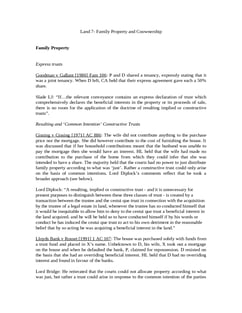Cheltenham & Gloucester BS v Norgan [1996] 1 All ER 449
Judgement for the case Cheltenham & Gloucester BS v Norgan
Table Of Contents
KEY POINTS
Mortgage possession involves the potential suspension of an order, especially in dwelling house mortgages.
The mortgagor must repay the principal sum with monthly interest payments, but falling behind prompts the crucial determination of a "reasonable period" to settle arrears.
Legal provisions in the Administration of Justice Act 1970 and 1973 guide this, considering whether the outstanding mortgage term or a shorter period is relevant. These acts aim to balance interests and ensure fair outcomes in mortgage disputes.
FACTS
In 1986, Christina Norgan (Defendant) purchased her husband's share of their house for £90,000 through a mortgage with Cheltenham and Gloucester Building Society (Respondent), seeking business finance.
The mortgage required repayment at the end of a 22-year term with monthly interest payments. Standard conditions allowed the society to take possession of an overdue monthly installment.
Business difficulties led to the husband falling behind, accumulating £7,000 in unpaid interest by April 1990.
-
The plaintiffs, Council of Mortgage Lenders members, took over the building society the same month.
Despite two suspensions by the district judge, arrears persisted, resulting in a possession warrant in 1990.
Further suspensions were granted in 1991, but substantial arrears remained.
On September 28, 1993, the plaintiffs applied for the warrant, and the judge, invoking powers under the Administration of Justice Acts, determined four years for repayment.
The judge granted the possession warrant, acknowledging the defendant's likely inability to pay within that timeframe.
JUDGEMENT
On appeal by the Defendant, it was held that the appeal was allowed, and the case was remitted to the county court.
The court determined that, in the absence of unusual circumstances, the starting point for determining the reasonable duration to keep a mortgagee out of possession, allowing time for the mortgagor to pay any sums due, was the outstanding term of the mortgage.
-
It was emphasized that, at the outset, disputes over attributing arrears to interest or principal should be resolved.
Additionally, the court should consider whether the delay would jeopardize the mortgagee's security and whether the mortgagor could sustain repayment of arrears by installments throughout the remaining mortgage term.
-
In the circumstances of the case, it was found that the judge had erred in adopting a repayment period unrelated to the outstanding mortgage term.
As a result, the decision was made to allow the appeal and remit the case to the county court for further consideration.
COMMENTARY
An appeal case was heard by Judge O'Malley in the Shaftesbury County Court involving the Defendant, Christina Norgan.
-
The appeal was pursued following the dismissal of her appeal against the order of Mr. Alan Hine, a deputy district judge.
The initial order related to the application to stay the warrant of execution issued by the Cheltenham and Gloucester Building Society (now Cheltenham and Gloucester Pic.) concerning Wickwood Hatch in Tisbury, Wiltshire.
The Court of Appeal granted the appeal under leave given on October 12, 1994, with Justices Simon Brown and Roch.
The grounds for the appeal included an assertion that Judge O'Malley erred in determining the "reasonable period" for the repayment of outstanding mortgage arrears. This determination was made under section 36(1) of the Administration of Justice Act 1970 and section 8 of the Administration of Justice Act 1973.
The case revolves around the period deemed reasonable for repayment of mortgage arrears and questions the judgment of Judge O'Malley on this matter.
ORIGINAL ANALYSIS
Defendant owed money to Plaintiff over her mortgage and the appeal was concerned with how long a “reasonable” period of time to allow repayment might be under s.36.
CA overturned the traditional attitude that possession orders would be postponed for 2-4 years, and instead made the starting point the date by which the loan was expected to have been repaid in full with interest.
To obtain this relief, the mortgagor has to show a detailed financial plan showing how they will be able to repay by this date.
For Further Study on Cheltenham & Gloucester BS v Norgan
Need instant answers? Our AI exam tutor is here to help.
Ask questions 🙋 Get answers 📔 It's simple 👁️👄👁️
Our AI is educated by the highest scoring students across all subjects and schools. Join hundreds of your peers today.
Get StartedSimilar Cases
Related Product Samples
These product samples contain the same concepts we cover in this case.
| Land Law | Remedies Of The Mortgagee Notes (7 pages) |

